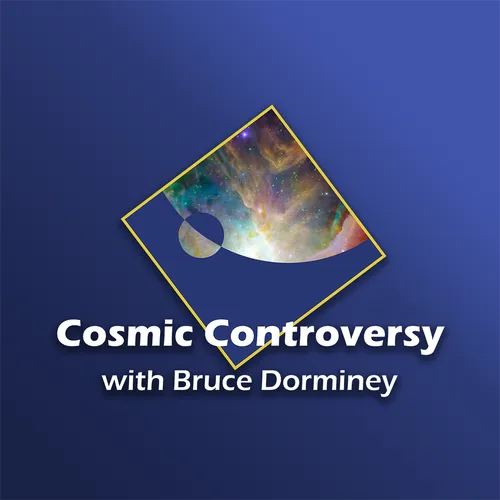
The Cosmic Controversy Podcast
Cosmic Controversy covers past and present issues in aerospace and astronomy with your host --- science journalist, Forbes contributor and ”Distant Wanderers: The Search for Planets Beyond the Solar System” author Bruce Dorminey.
- Update frequency
- every 6 days
- Average duration
- 58 minutes
- Episodes
- 67
- Years Active
- 2020 - 2021

Episode 27 --- Why Mars Went Wrong
NASA’s MAVEN orbiter has arguably done more to document how and why Mars lost its atmosphere and much of its water than any spacecraft ever sent to the red planet. The mission’s principal investigat…

Episode 26 --- How The Cold War Spurred The Earliest Days Of Interplanetary Exploration
The earliest days of robotic space exploration, to the Moon, Venus, Mars, and even Mercury, likely would never have played out in such dramatic fashion in the late 1950s and early 1960s without the C…

Episode 25 --- Getting To Know Andromeda, Our Grand Spiral Neighbor
First cataloged by Al Sufi as a mere optical smudge high in the winter sky, the Andromeda Galaxy has lately been a cornerstone of everything we know about contemporary astronomy and the cosmos as a w…

Episode 24 --- How Oxygen Transformed Our Planet Earth
From Pachyderms to Cetaceans, the largest mammals on Earth would arguably never have evolved to their gargantuan sizes without the third most abundant element in the Cosmos --- Oxygen. Of course, li…

Episode 23 --- China’s Space Agenda Gets Serious
China is building on a decade of lunar exploration with this month’s launch of its Chang’e 5 sample return mission; China has an orbiter and lander halfway to Mars; and by 2022 plans on putting a per…

Episode 22 --- The Far Future Of Our Universe (Turtles All the Way Down)
What happens when all the stars in our cosmos’ galaxies burn out; with little or no hydrogen gas left to fuel star formation; and everything pretty much turns to toast? It will presage an age of bla…

Episode 21 --- How Aircraft Propellers Drove The Aeronautical Revolution
Without the lowly propeller, global trade and commerce and freedom of movement as we knew it prior to Covid would have never had the opportunity to flourish. Special guest Jeremy R. Kinney, Chair of…

Episode 20 --- The Case for a Lunar Science Moon Rush
Notre Dame Planetary Geologist Clive Neal stops by the podcast for a terrifically candid discussion of why the Moon has to be the first stop en route to Mars. We talk about why the Moon holds the ke…

Episode 19 --- The Trouble With Mercury: Our Solar System's Bizarre Innermost Planet
Guest Catherine Johnson, a planetary geophysicist at the University of British Columbia in Vancouver, discusses this bizarre little world; the innermost planet in our solar system. A planet that’s s…

Episode 18 --- The Heyday of Flying by the Stars
Retired commercial pilot, crash investigator, and aviation attorney Gary LaPook joins me to discuss the development and practice of celestial air navigation in passenger aircraft; how it worked; why …

Episode 17 --- How We All Got Here --- Galaxy Evolution over Cosmic Time
For anyone who’s ever wondered how our own star happened to be caught up in the midst of a grand spiral beauty like our Milky Way, this episode should at least provide some clues. It’s a big cosmolo…

Episode 16 --- Deciphering Fast Radio Bursts (FRBs), arguably the most bizarre radio emissions ever detected.
Fast Radio Bursts (FRBs) have hogged the headlines for the last decade or so; prompting many news organizations to question whether they are produced by far-flung alien civilizations in the midst of …

Episode 15 --- Amelia Earhart Disappearance Is Likely Very Close To Being Solved
Amelia Earhart, arguably the most famous woman in the world at the time of her 1937 disappearance, was on a second attempt to fly around the world when something went horribly wrong. However, what a…

Episode 14 --- Does the Dwarf Planet Ceres Harbor Life?
This week's guest is NASA Dawn project scientist Julie Castillo-Rogez who led the hugely successful robotic mission on the first in-depth look at the asteroid Vesta and the dwarf planet Ceres. Casti…

Episode 13 --- Why Future Space-Based Arrays Of Optical Telescopes Will Likely Be 3-D Printed In Orbit
Lowell Observatory astronomer Gerard van Belle, Chief Scientist at the Navy Precision Optical Interferometer (NPOI) in Flagstaff. Arizona talks about the possibility of arrays of space telescopes tha…

Episode 12 --- Understanding Potential Alien Technosignatures
This week’s guest is Adam Frank, a professor of physics and astronomy at the University of Rochester in New York, who has received the first-ever NASA grant to begin cataloging potential alien techno…

Episode 11 --- Betelgeuse Dimming Mystery Might Be Solved, Says Edward Guinan
In a stroke of serendipity during a wide-ranging podcast interview, Villanova University astronomer Edward Guinan explains the paper behind today's news flap about the red supergiant star's inexplica…

Episode 10 --- Why Mars Remains So Misunderstood
Three spacecraft are currently en route to Mars, but none will visit the poles. Yet Mars’ poles drive much of the Martian climate. And their understanding is key to deciphering what might have been…

Episode 9 --- How ESA's GAIA Satellite Is Revolutionizing Our Understanding of the Milky Way
Dutch astronomer Anthony Brown of Leiden University explains how the European Space Agency's GAIA satellite is revolutionizing what we know about the Milky Way. This all-sky survey mission revisits …

Episode 8 --- How NASA’s $10 Billion Webb Telescope Will Help Us Figure Out Our Own Solar System
When first conceived, the 6.5 meter James Webb Space Telescope was all about galaxy surveys, the deep sky, and cosmology; it still is. But it’s also about solar system science in surprising ways. T…